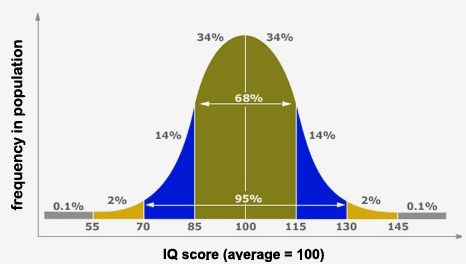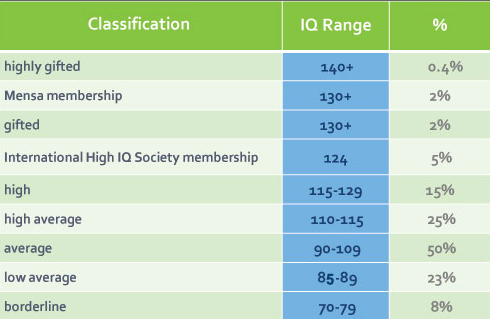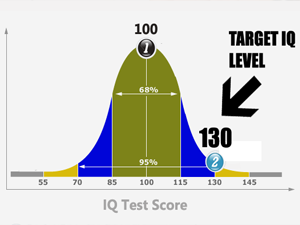In this blog you will learn the following
- The IQ score you need to become a Mensa member.
- An explanation of how a Mensa IQ score compares to an average IQ.
- The official IQ tests that qualify you for Mensa membership.
- Where to find practice IQ tests for Mensa.
- How to prepare for taking a Mensa qualifying IQ test to maximize your chances of success.
- What is Mensa and what are advantages to being a Mensa member.
An IQ in the Top 2%
Getting into Mensa is not easy, even with ample preparation and training. You have to score at or above the 98th percentile – the top 2% – on a standardized, professionally administered IQ test. This is typically a score of 130 or more.
What does an IQ score of 130 mean?
The IQ Score Bell Curve
As we saw in Part One standardized IQ tests are designed so that their scores have a ‘bell curve’ distribution in the general population with an average of 100. This curve has a peak in the middle where most people score and tapering ends where only a small percentage of people score. In statistics this distribution of scores is called a bell curve or normal distribution – as shown below.

Standardized IQ tests are designed so that the exact average (mean) IQ score in the general population is 100. An ‘average IQ score’ or ‘normal IQ score’ can be defined as a score between 85 and 115. 68% of people score between 85 and 115.
The Mensa qualifying IQ score is a score that puts you in the top 2% of the population in a bell curve like this one. The Mensa qualifying score is 130 or higher, as shown below.
This table indicates how IQ levels can be classified.

Note that this IQ scale is meaningless unless you obtain a score from a valid, standardized IQ test. Most of these tests are professionally administered – for a fee!
How to Test Your IQ? Mensa Accredited IQ Tests
Standardized IQ tests accepted for Mensa membership are administered by school districts (e.g. the Cognitive Abilities Test (CogAT)), private psychologists (see below), the military (e.g. Army GCT) and human resource departments (e.g. the Wonderlic). There are two broad types of intelligence test:
- ‘Full-scale’ IQ tests, made up of subtests for fluid intelligence (Gf) as well as vocabulary and general knowledge, visuo-spatial ability, short term memory, and processing speed. Sometimes quantitative/mathematical reasoning is also tested in ‘full scale’ tests. A popular example is the WAIS-IV IQ test.
- Culture-fair tests of fluid intelligence. Fluid intelligence is our ability to reason and problem solve, independently of familiarity, training and practice. These tests measure intelligence without the influence of cultural climate, level of education or verbal fluency. They are non-verbal and require only that candidates be able to distinguish relationships in figures and shapes. A well-known example of a ‘culture fair’ test is the Raven Advanced Progressive Matrices test.
Mensa accepts scores from approximately 200 different standardized intelligence tests (click for qualifying test information here). Some are fluid intelligence tests. Some are full-scale tests.
The more well-known IQ tests can cost in the region of $300-$500 for a professionally administered assessment.
The Mensa Admission Test
If you have not already taken an approved IQ test where you scored in the top 2%, a cost-effective method of measuring your true IQ level is to take a Mensa supervised test – $40.00 in the US / £24.95 in the UK. This fee includes:
- A reserved place at the centre of your choice.
- The opportunity to take two IQ test papers. The Cattell III B and the Cattell Culture Fair III A.
- American Mensa offers two test batteries by Mensa proctors that may qualify you for membership. The first includes both the Mensa Admission Test and the Mensa Wonderlic®; this is the battery of tests given most frequently. This is a full-scale IQ test. The second battery is a “culture fair” battery that includes the Cattell Culture Fair, the Nonverbal Reasoning Test and the SRA Pictorial Reasoning Test. This is primarily a fluid intelligence test. This needs to be requested specifically.
- The marking of your IQ test papers and your results returned to you in confidence.
Mensa Supervised test sessions are held at centres throughout your home country. Click here for details from International Mensa. For those in the US click here. For those in the UK click here.
Mensa Online Practice IQ tests
The Mensa Workout
To get you limbered up, try the Mensa Workout. This quiz is not an official IQ test to qualify you for Mensa but gives you a good idea of the range of question types involved in official IQ testing. The questions on the “Mensa Workout” are biased towards people whose primary language is English. You have half an hour to answer 30 questions.
The Mensa Home Test
Alternatively you can take the online Mensa home test for $18. As explained by American Mensa:
The Mensa Home Test is a fun way to discover if you are Mensa material. While this timed test will not qualify you for membership, it does offer an equivalent score that correlates to your IQ range and provides a strong indication of your likelihood for success should you choose to take our admission test. For only $18, you can take the Mensa Home Test online now, and it will be scored immediately.
Other Online Practice Tests
The GIQ Test
The GIQ test will give you a good standardized estimate of your ‘full scale’ IQ – combining fluid intelligence (non-verbal) and verbal problems. The fee is $10. According to the test-makers:
The GIQ Test is an online analog for the most common clinically proctored IQ tests. In our internal study, the GIQTest correlated within about 4% of an individual’s full scale score on a clinically proctored IQ test. The GIQTest’s sections are modeled after clinical IQ test sections.
The GIQ has the following features
- Time required: 25-45 minutes estimated. No time limit.
- Components of intelligence measured: full scale intelligence, ‘verbal’, ‘spatial’ and ‘quantitative’ intelligence. Your performance sub-score on this test can substitute as a measure of your fluid intelligence.
- Culture fair IQ test? No. Vocabulary, similarities and arithmetic subtests are culture-dependent.
- Fee: $10
The iqtest.dk
This is a fluid intelligence test of culture-fair reasoning and problem solving skills. As explained on the website:
This test is developed with the aim of measuring your Intelligence Quotient (IQ). The test is Culture Fair, i.e. it minimises the effect of cultural variables, such as language, mathematics, etc. The test is based on logic, but is furthermore designed to test learning capability, memory, innovative thinking and the ability to simultaneously address several problems. The test measures the general intelligence – g. The calculation of IQ is based on answers from more than 250,000 people
Getting into Mensa: Training Strategies
As noted above, Mensa accept two types of officially administered IQ tests: ‘culture fair’ tests that measure fluid intelligence – your abstract reasoning and problem solving skills; and ‘full scale’ tests that measure all sub-factors of your intelligence, including verbal and quantitative intelligence. There is a Mensa Admission Test for both. The culture fair test needs to be requested specifically.
To prepare for a full scale Mensa qualifying test, we recommend the following.
Full scale IQ strategy
- Schedule a month in advance a Mensa accredited full scale IQ test with a psychologist or educationalist or a standard Mensa Admission Test with your local Mensa organisation. Ensure that you establish that the test is ‘full scale’ – including verbal and quantitative problems.
- Take the Mensa workout (see above).
- Take the Mensa home test (see above).
- Take the GIQ test (see above).
- All these practice tests will give you a good estimate of your current full scale IQ level – the type that is tested on the standard Mensa Admission test.
- Leading up to your qualifying IQ test, commit to training your working memory capacity. Working memory capacity is your mental ‘workspace’. The larger the capacity, the more complex reasoning and problem solving you can do, and the more efficiently you can learn test taking strategies. There is a body of scientific evidence showing that working memory training can have widespread benefits for IQ and cognitive performance (review).
- Leading up to your qualifying IQ test, commit to practicing full scale IQ test problems. It is known that this practice can substantially improve scores on full scale tests. Here is one resource for practice.
- There are other lifestyle practices you can adopt over this period to increase your brain performance. These include regular exercise, intermittent fasting and a ‘brain healthy’ diet. Mindfulness meditation is another strategy that can improve the results from your training.
- After completing the working memory training, allow for at least two days before taking the qualifying IQ test – to allow for consolidation of the neuroplasticity changes.
- Take the official test.
Culture fair strategy
- Take the free iqtest.dk. This will give you a good estimate of your current IQ level. Take a note of your score. If it is 115 or higher, with the right preparation and training you have a good chance of attaining a qualifying score of 130 on a Mensa accredited IQ test for fluid intelligence.
- Schedule a month in advance a professionally administered fluid (culture-fair) IQ test such as the Raven Advanced Progressive Matrices (RAPM) or the Cattell Culture Fair III IQ test with a local psychologist or educationalist. Alternatively, request the ‘culture fair’ Mensa admissions tests from your local Mensa society. Culture fair tests are essentially fluid intelligence tests.
- Leading up to your qualifying IQ test, commit to training your working memory capacity. Working memory capacity is your mental ‘workspace’. The larger the capacity, the more complex reasoning and problem solving you can do. There is a body of scientific evidence showing that working memory training can have widespread benefits for IQ and cognitive performance (review).
- Leading up to your qualifying IQ test, commit to training your IQ problem solving strategies.Practice on fluid intelligence IQ tests, such as found here on SmartKit.
- There are other lifestyle practices you can adopt over this period to increase your brain performance. These include regular exercise, intermittent fasting and a ‘brain healthy’ diet. Mindfulness meditation is another strategy that can improve the results from your training.
- After completing the working memory training program, allow for at least two days before taking the qualifying IQ test for consolidation of neuroplasticity changes.
- Take the official test.
Additional Mensa Information
There are now around 100,000 Mensans in 100 countries throughout the world. There are active Mensa organizations in over 40 countries on every continent except Antarctica. The website for Mensa International can be found here. Websites for national groups can be found here.
Advantages of being a Mensa member
Mental stimulation
You can find intellectual resources to exercise your brain in national magazines, in local newsletters, and at regional, national and international conventions. Mensans (Mensa members) have a profusion of special interest groups. To quote from Mensa International:
Whatever your passion, there’s almost certain to be a Special Interest Group (SIG) filled with other Mensans who share it! Mensa offers approximately 200 SIGs, in mind-boggling profusion from African Violets to zoology. Along the way you’ll find microbiology, and systems analysis, but you’ll also find Sherlock Holmes, chocolate and Star Trek. There are the expected: biochemistry, space science, economics — and the unexpected: poker, roller-skating, scuba diving, UFOs and witchcraft. There are SIGs for breadmaking, winemaking, cartooning, silversmithing, and clowning. Heraldry, semantics and Egyptology co-exist with beekeeping, motorcycling and tap dancing. Sports SIGs cover the classics (baseball, basketball, and football) and the not-so-classic (skeet shooting, hang gliding, skydiving). And any Mensan who can’t find a SIG to join can easily start one.
Social life
Local groups meet monthly or even more regularly. There are widely attended annual conventions offering workshops, seminars, and parties.
Mensa member publications
You will receive your national magazine with contributions by Mensans on a wide variety of subjects. In some countries, in addition to the national magazine you may receive lively local newsletters. Mensa also publishes it’s own research journal on IQ related topics – The Mensa Research Journal – for the general public.
Career advantage
In some countries Mensa sponsors a members-only credit card and insurance program. There is also a program that aids traveling Mensans. There have been reports that job applications have been easier with Mensa membership on your CV – particularly if the hiring person is also a Mensan.




Dear Mark,
I’ve visited this web site by chance and found it very enlightening and interesting. I’m currently a member of several IQ societies that require attaining high scores in so called high range IQ tests that are usually untimed. I had a good score in one Stanford Binet test decades ago while working for IBM Philippines but lost the copy of the test result when we moved to Canada in the late sixties. I still have the urge to join Mensa but my reaction time now is more slower due to age (approaching 80). Is the
culture fair test more suitable for senior people since I heard that there is no time limit for the Mensa proctored test ? Wonderlic is another possibility since I’m still adept at mental calculation.
Sincerely,
Ernie Marasigan, P.E., P.Eng.
(Richmond Hill, Canada)